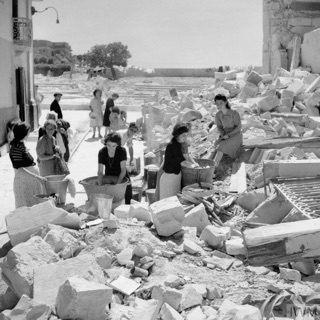
Podcast: Play in new window | Download (Duration: 29:09 — 26.8MB)
Subscribe: Google Podcasts | Spotify | Android | RSS | More
 Malta, just off the coast of Sicily in the middle of the Mediterranean, has always been of enormous strategic importance. As a result it has been claimed, and fought over, by empire after empire. Each time it was vulnerable to a blockade of essential food supplies because the tiny island — Malta is only 27 kilometres long — cannot possibly feed itself. Despite this history, going into World War II neither the British colonial government nor the Maltese people were prepared for the inevitable blockade. When rationing was imposed, however, the authorities deliberately turned a blind eye to those who were finding ways to evade the restrictions of the black market. It made sense to do so, as I heard from Maltese historian Noel Buttigieg.
Malta, just off the coast of Sicily in the middle of the Mediterranean, has always been of enormous strategic importance. As a result it has been claimed, and fought over, by empire after empire. Each time it was vulnerable to a blockade of essential food supplies because the tiny island — Malta is only 27 kilometres long — cannot possibly feed itself. Despite this history, going into World War II neither the British colonial government nor the Maltese people were prepared for the inevitable blockade. When rationing was imposed, however, the authorities deliberately turned a blind eye to those who were finding ways to evade the restrictions of the black market. It made sense to do so, as I heard from Maltese historian Noel Buttigieg.
Notes
- Noel Buttigieg’s paper is Breadways and Black-Market Intrigues in 1942 Malta.
- Here is the transcript.
- The banner photograph shows part of the Turkish fleet and military at the start of the 1565 Great Siege of Malta. It was created by Giovanni Francesco Camocio as part of an effort to rouse European support against the Turks. Cover photograph shows Maltese women washing clothes in the ruins of their homes at the height of the blockade, 4 June 1942. ©IWM (GM 904)

This Article was mentioned on brid.gy
@InkySchwartz yes, of course. I should perhaps have mentioned the very fine Neolithic settlements but given that my guest started with the Romans I thought it ok to leave that out.
@etp A lovely set of Mediterranean islands but they very much need to be tied into trade networks to feed everyone.The possible excption is the neolithic period when the stone temples were erected. But that’s because the archeology shows both intensive ag domestically and overseas contact but little food moving that way. But that really means we don’t know if there were food imports then.
This Article was mentioned on brid.gy